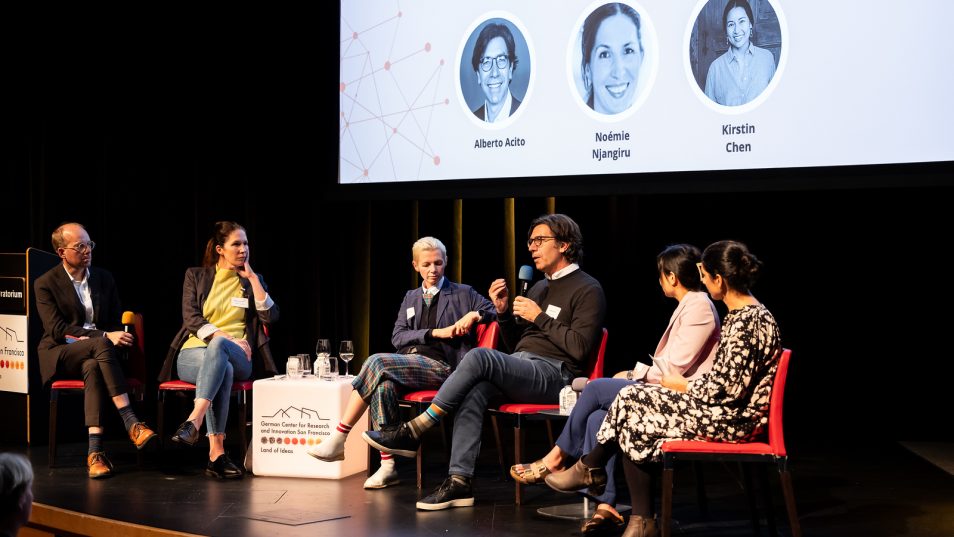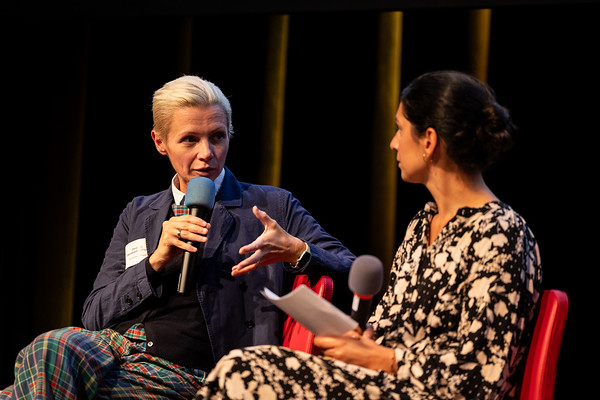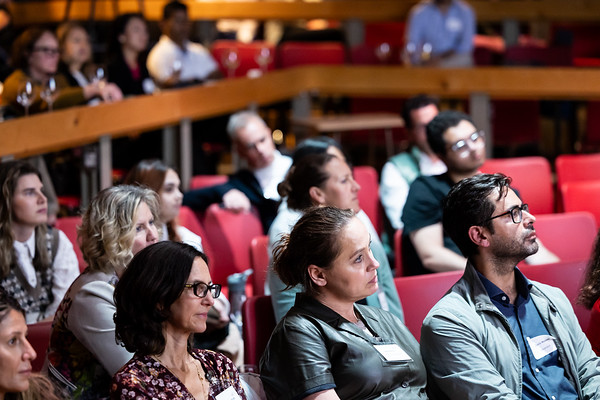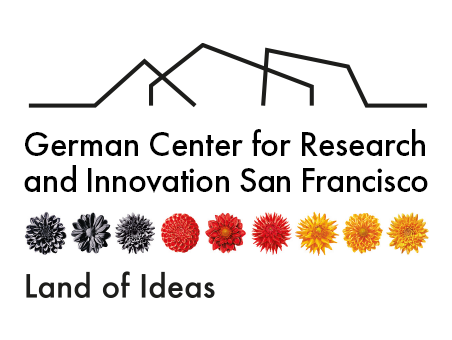Resilient Societies: The Bay Area's Reinvention through Culture and Innovation

On October 10th, DWIH San Francisco held its signature event on Resilient Societies: The Bay Area’s Reinvention Through Culture and Innovation, where it focused on how art and culture foster innovation and how the unique mindset in the San Francisco Bay Area contributes to resilience. Moderated by Martin Rauchbauer, Executive Director of the Djerassi Resident Artists Program, and Zahar Barth-Manzoori, Director of the DWIH San Francisco, the evening touched on the Bay Area’s key strength — its ability to attract innovators from diverse backgrounds and how it brings people together to spawn new ideas. Panelists included long-term residents of the Bay Area, as well as more recent transplants who shared their experiences living in the Bay Area and how we should look to the future of the region we call home.
The fir st speaker was Christina Steinbrecher-Pfandt, CEO of the Tech Diplomacy Network, whose goal is to make art borderless for everyone through means of technology. Having lived in many cities around the world, Steinbrecher-Pfandt explained how she came to discover blockchain as a powerful framework for distributing art as well as its ability to enable people to profit financially. However, she realized that many policymakers in Europe knew little idea about its effect and that artists could not benefit from its rise. This inspired her work in the Bay Area, which has a more forward-looking community of people. Steinbrecher-Pfandt noted that she was humbled by the “pull yourself by your bootstraps” mentality here and communities coming together without state support. This culture starkly contrasts with that in the German-speaking world, where people tend to list problems first and demanding solutions. She remarked that venture capitalists and entrepreneurs here are more open to listening to an early idea and that they are generally willing to offer fifteen minutes of their time to give feedback to innovators.
st speaker was Christina Steinbrecher-Pfandt, CEO of the Tech Diplomacy Network, whose goal is to make art borderless for everyone through means of technology. Having lived in many cities around the world, Steinbrecher-Pfandt explained how she came to discover blockchain as a powerful framework for distributing art as well as its ability to enable people to profit financially. However, she realized that many policymakers in Europe knew little idea about its effect and that artists could not benefit from its rise. This inspired her work in the Bay Area, which has a more forward-looking community of people. Steinbrecher-Pfandt noted that she was humbled by the “pull yourself by your bootstraps” mentality here and communities coming together without state support. This culture starkly contrasts with that in the German-speaking world, where people tend to list problems first and demanding solutions. She remarked that venture capitalists and entrepreneurs here are more open to listening to an early idea and that they are generally willing to offer fifteen minutes of their time to give feedback to innovators.
 The conversation then shifted to Alberto Acito, Director of the Italian Innovation Center (Innovit) in San Francisco. Originally from Italy but a resident of the Bay Area for the past ten years, Acito explained that resilience in Italy has a different meaning, given the frequent political, economic, and social changes throughout its history. Italians have a mentality to change incrementally in fashion, food, or politics. This, of course, contrasts with Silicon Valley’s mantra of “moving fast and breaking things”, but Acito emphasized that resilience should mean moving forward without forgetting our past – our local culture and immigrant roots. When asked about the role of Innovit, Acito discussed the intersection of technology and culture as Italy’s specialty, and said he was proud of the institute’s ability to offer regular exhibitions at a time when governments around the world deemphasize art. This commitment reflects the Italian understanding that artists are at the forefront of change and that wealthy patrons (all the way from the Renaissance period) have regularly supported innovation. Indeed, Acito’s role in facilitating the integration between the Italian and US tech ecosystems gives him a unique voice in shaping whether changes happen in a way that places the human being at the center.
The conversation then shifted to Alberto Acito, Director of the Italian Innovation Center (Innovit) in San Francisco. Originally from Italy but a resident of the Bay Area for the past ten years, Acito explained that resilience in Italy has a different meaning, given the frequent political, economic, and social changes throughout its history. Italians have a mentality to change incrementally in fashion, food, or politics. This, of course, contrasts with Silicon Valley’s mantra of “moving fast and breaking things”, but Acito emphasized that resilience should mean moving forward without forgetting our past – our local culture and immigrant roots. When asked about the role of Innovit, Acito discussed the intersection of technology and culture as Italy’s specialty, and said he was proud of the institute’s ability to offer regular exhibitions at a time when governments around the world deemphasize art. This commitment reflects the Italian understanding that artists are at the forefront of change and that wealthy patrons (all the way from the Renaissance period) have regularly supported innovation. Indeed, Acito’s role in facilitating the integration between the Italian and US tech ecosystems gives him a unique voice in shaping whether changes happen in a way that places the human being at the center.
 The next panelist was Noémie Njangiru, head of the Goethe Institute San Francisco. After living in Johannesburg and Nairobi, all which are very innovative places, Njangiru was struck by the sheer amount of money and how that influences innovation in the Bay Area. She recently initiated a new concept called C/Change at the Goethe Institute, which investigates how emerging technologies, when imbued with intentional design, can open new, diverse perspectives and channels for cross-cultural connection in a changing world. C/Change gives a platform to those traditionally underrepresented in tech, and some topics have included exploring the role of feminist voices and decolonization in AI. For Njangiru, the Bay Area mindset means coming together to creatively explore solutions and prototype ideas. This means working with people directly involved in developing technologies to ensure that they include those affected by technologies and consider the consequences of their work on others.
The next panelist was Noémie Njangiru, head of the Goethe Institute San Francisco. After living in Johannesburg and Nairobi, all which are very innovative places, Njangiru was struck by the sheer amount of money and how that influences innovation in the Bay Area. She recently initiated a new concept called C/Change at the Goethe Institute, which investigates how emerging technologies, when imbued with intentional design, can open new, diverse perspectives and channels for cross-cultural connection in a changing world. C/Change gives a platform to those traditionally underrepresented in tech, and some topics have included exploring the role of feminist voices and decolonization in AI. For Njangiru, the Bay Area mindset means coming together to creatively explore solutions and prototype ideas. This means working with people directly involved in developing technologies to ensure that they include those affected by technologies and consider the consequences of their work on others.
 Finally, the moderators brought Kirstin Chen, a New York Times best-selling author of three novels, to the stage. A resident of the Djerassi program, Chen is currently writing a book titled Tech Wives that explores fakeness in our modern society. Her previous work, Counterfeit, is a crime novel about two Asian-American women who band together to grow a counterfeit handbag scheme into a global enterprise. Chen remarked that the setting of the Bay Area as a place of reinvention, immigrants, and innovation is critical to her work. Particularly, she discussed sanctioned versus unsanctioned “cheating” in the form of audacious claims, for which the Bay Area is known, and who has the privilege of “cheating.” Rauchbauer then asked her about the research for Tech Wives, and Chen explained that the most interesting narrators in fiction are those who are not the most charismatic, but rather one level removed from the center of the action. In focusing on the wives of tech moguls, Chen sought to reveal the perspectives of wives who can have seen what others cannot see and who serve as a metaphor for the Silicon Valley mindset.
Finally, the moderators brought Kirstin Chen, a New York Times best-selling author of three novels, to the stage. A resident of the Djerassi program, Chen is currently writing a book titled Tech Wives that explores fakeness in our modern society. Her previous work, Counterfeit, is a crime novel about two Asian-American women who band together to grow a counterfeit handbag scheme into a global enterprise. Chen remarked that the setting of the Bay Area as a place of reinvention, immigrants, and innovation is critical to her work. Particularly, she discussed sanctioned versus unsanctioned “cheating” in the form of audacious claims, for which the Bay Area is known, and who has the privilege of “cheating.” Rauchbauer then asked her about the research for Tech Wives, and Chen explained that the most interesting narrators in fiction are those who are not the most charismatic, but rather one level removed from the center of the action. In focusing on the wives of tech moguls, Chen sought to reveal the perspectives of wives who can have seen what others cannot see and who serve as a metaphor for the Silicon Valley mindset.
 The event brought together around ninety people and mixed audience questions with the panel discussions. It concluded with a reception, where participants stayed long after to engage one-on-one with the speakers. The event was sponsored by the German Center for Research and Innovation and supported by the Tech Diplomacy Network and the Djerassi Resident Artists Program.
The event brought together around ninety people and mixed audience questions with the panel discussions. It concluded with a reception, where participants stayed long after to engage one-on-one with the speakers. The event was sponsored by the German Center for Research and Innovation and supported by the Tech Diplomacy Network and the Djerassi Resident Artists Program.
See all photos from the event here. Please credit Barak Shrama Photography if you plan to reuse these photos.
